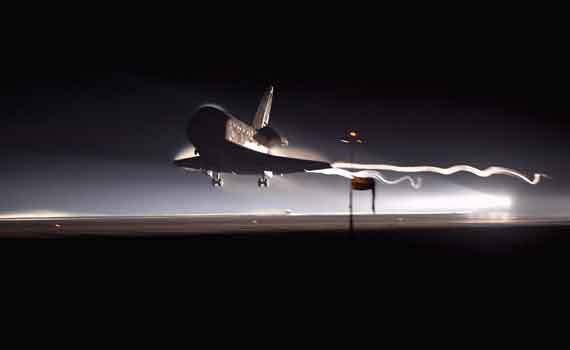Space Shuttle Lands on Another World
[]
When the space shuttle Atlantis glided majestically through the early morning darkness and touched down at the Kennedy Space Center on July 21, it landed on a different planet than the one Columbia first took off from in April 1981.
Atlantis landed on a hotter, more crowded planet, one engulfed in economic and ideological crisis. Even if we could afford it, it’s doubtful the religion-obsessed, anti-science, antiprogress politicians who dominate our current moment could muster the vision to develop something so ambitious—which may be a good thing.
We hail the shuttle mission as a technological achievement, yet Atlantis is an appropriate name for a spacecraft returning to a world that cannot handle the power or responsibility of its own technology.
The last shuttle returned to Earth entering through a more radioactive atmosphere, with its air and oceans contaminated by a vast diversity of persistent toxins. It’s true that by 1981 the environmental situation was at a critical level, yet in three decades that crisis has grown exponentially. The number of chemicals being produced, and the amount, is unconscionable; the amount of plastic going into the oceans; the dumping of solvents into the oceans to break down the millions of gallons of crude oil that are spilled every year.
Storms, extremes of temperature, melting ice caps, hurricanes, tornado supercells, earthquakes, and famines are more frequent, to the point where they now seem commonplace. In 1981, most people did not know what the word tsunami meant. They didn’t learn it studying for the spelling bee.
Many municipal water supplies are contaminated by the mood-altering drugs used to quell what is in truth a mass-epidemic psychological crisis.
In 1981, there were 500,000 people in prison in the US. Today, there are 2.5 million. The world population has not quite doubled in that same time, from 4.5 billion in 1981 to 6.75 billion today. There is less fresh water left, as water tables are pumped dry for irrigation and animal production. Hydrofracking now contaminates otherwise good water supplies in communities eager to profit from our energy-hungry world. Today’s cars still run on the same basic principle as the Model A—an explosion of carbon fuel inside a cylinder.
In 1981, the national debt of the United States was about a trillion dollars; today, it’s $14 trillion. Much of that money has gone for military purposes. Since 1981 (just a few years after we pulled out of Vietnam, Laos, and Cambodia), the United States has fought in or been responsible for wars in El Salvador, Nicaragua, East Timor, Iraq, the Balkans, Afghanistan, Iraq (again), and Libya. The world is still rigged with nuclear bombs. Since the fall of the Soviet empire, many have gone missing. There are hundreds of thousands of tons of nuclear waste piling up with nowhere to go.
The end of the 30-year shuttle mission marks a phase in the history of human space exploration, but it also marks a distinct phase in history overall. In the early 1980s, the Republican movement began its merger with the Christian movement, turning churches into political clubhouses and morphing the fundamentalist agenda with our supposed national priorities. That blend of agendas has resulted in the adoption of 80 state laws designed to restrict abortion rights in 2011 alone, all of which are based on religious ideology that amounts to a war on women.
In the spring of 1981, when Columbia took off, US schools—under the direction of the Reagan administration, with help from the Heritage Foundation—began a program of abstinence-only indoctrination. This created generations of young people whose most dependable source of sex education is now pornography. The first articles about AIDS appeared in the New York Times in the spring of 1981. The number of people living with HIV increased every year until 2009.
We are in a moment when we need the most enlightened leaders, with the broadest vision and sense of the future, yet we seem to have precisely the opposite: those driven by narrowness, fear, and ideological obsession. As I write, the United States is being backed against its debt limit by politicians who either don’t understand the concept of default, or who are too caught in their own apocalyptic visions to spare a rational thought for the safety of the world economy.
While I am describing the world’s problems, which are really our problems, let’s add one more. During July, we in the United States finally caught wind of what was happening to the news media throughout the English-speaking world (and much of Europe and Asia). It was being metastasized by a company called News Corp, which subverted the primary mission of the press—to inform people—with a vast criminal enterprise funded and driven by a propaganda machine. Worse, it appears that Rupert Murdoch & Co. used the information they had to run a kind of blackmail operation that led many people to stay quiet about what they were really up to.
Yet there are many layers of the issue that most people have yet to hear about, such as Murdoch’s role in building up the climate change denial movement. That Murdoch has fallen on hard times is some of the best news in these 30 years since Columbia first took off, a rare moment of transparency and an actual negative result of evil deeds befalling the one who was responsible. Yet the power vacuum that may be created by Murdoch’s fall is not automatically an improvement in our condition; two other things have to happen.
The first is that many people have to take on an increased role in accumulating and distributing valid, relevant information. The second is that many more people have to be interested in hearing about it. World crisis puts people into crisis, which has a way of eating their time and energy and making us less available to participate in change. In the 1960s the youth that participated in the anti-war and environmental movements were not working three jobs. Today the affluent ones who might be available often find themselves being entertained to death.
T. S. Eliot observed in 1936 that “human kind cannot bear very much reality,” though now we have more to bear than ever. Throughout history, most people have balked at exerting their influence on the greater scheme, and it doesn’t help that we’re consistently brainwashed to believe that having an influence is impossible.
It would be far easier for people to have an influence were that actually our agenda. Even when we’re working three jobs, we find the time to do at least some of the things that are important to us. If we opened up to the necessities at hand, we might be motivated to do something about them. So while humanity has not been capable of dealing with very much reality—and Eliot was describing a very long span of time in that poem—it does not help when people are driven into psychological, emotional, and spiritual crisis that paralyzes them further.
We are right to wonder how the people of the world are ever going to deal with the problems we face. Obviously we cannot leave it to our “leaders,” who in the United States are obsessed with collective death and wrapping the female body in barbed wire, and who in the UK are getting drunk with corrupt newspaper reporters, the police, and convicted private investigators.
Because the global crisis depends on individual crisis as a power source, and as a way of blocking solutions, then it’s clear that working to heal ourselves is a crucial step in any wide-scale solution. If we as individuals don’t feel better, and less overwhelmed, then there’s no way we can take on the challenges of the world. If we’re so busy fighting ourselves, and obsessing over petty sins, and demanding that certain people not get to go to the doctor when they need to, we’re obviously not joining together to do something about the problems we perceive. Therefore, working on individual healing is a necessary prerequisite to planetary healing.
That, however, can be a trap of its own. I have met many, many well-meaning people who do all kinds of things to make themselves “better” people who still cannot muster the willpower to take on something larger than their own life. I know many people obsessed with spirituality, yoga, taking ayahuasca, attending self-improvement workshops (and so on) but who rarely participate in anything more than that. This has always mystified me, but maybe I’m a little naïve.
Self-indulgence presents a trap, and it’s often wrapped in the cloak of self-improvement. Participation takes time, energy, effort, and often requires personal resources. You don’t usually get an expense account working as an activist. You have to figure out how to get to the demonstration, or how to fund your project. On one significant level this is a question of one’s agenda. If you want to do something, usually you will figure out a way. If you have a goal that takes more than one person, it’s usually pretty easy to find others with the same goal—if you want to.
And this brings us back to the purpose of civilization itself. The first cuneiform writing was not created to publish romances or News of the World. It was developed so that one generation could pass the instructions for growing crops down to the next. We created writing not for personal expression but to ensure collective survival. Next time you see a cookbook, remember that’s from the oldest genre of literature.
What we seem to lack in our moment of history is the notion that there’s an intersection between individual needs and collective needs. If we put some of our individual energy into a collective pool, we’ll be able to accomplish more and take care of many more people. Here, we can divine something from the current political agenda of no taxes / no social safety net / no care for the future. This agenda defies the notion of civilization itself: that if we need to stand up to the elements, if we need to make buildings to stay warm and dry, we simply must recognize that collective necessities have everything in common with individual necessities.
If we can get clear about that, we would understand that the reason we improve ourselves, and individuate, is specifically to expand into a collective experience. Most people don’t sit hour after hour and learn guitar chords merely for themselves or for the sake of doing it; eventually, you want to play music for others. So when you take yoga and journey into the underworld and do five-day workshop intensives or read books about growing whole, ask yourself why you’re doing it, and remember—there actually is a reason. Action is the fruit of knowledge.
If we study the moment when the shuttle Atlantis landed on Earth for the last time, we can learn a lot. The thing we need to search for the most carefully is a central idea: the one that will tell us about our common interests. In terms of all the basics and many of the flourishes of life, we’re all in this together.



















